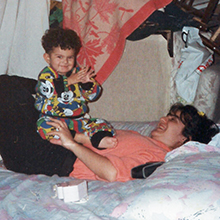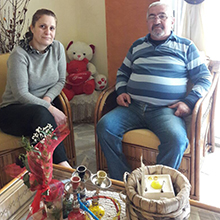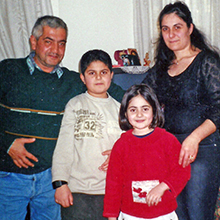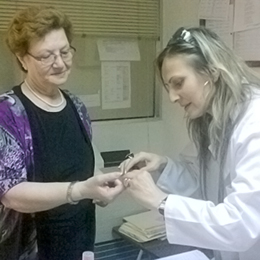By Cara Taylor | Jinishian Memorial Program
Mardo and Maral Kharpoutlian were engaged during the Lebanese civil war in the 1980’s, then misfortune struck: a collapsing balcony immobilized Mardo for a year. Their savings disappeared in a bank closure, and their textile supplier went out of business. Unable to pay rent, they made a home in the back half of their sewing shop, although it had no kitchen.
 After their second child, they filed for emergency housing with little hope of being selected among the 400 other applicants. Yet when a social worker with the Jinishian Memorial Program reported their unhealthy living conditions, they were offered a contract for apartment ownership paid over 20 years. Thinking it was too good to be true, Maral tried to return the keys, but the JMP director encouraged her to keep faith and work hard.
After their second child, they filed for emergency housing with little hope of being selected among the 400 other applicants. Yet when a social worker with the Jinishian Memorial Program reported their unhealthy living conditions, they were offered a contract for apartment ownership paid over 20 years. Thinking it was too good to be true, Maral tried to return the keys, but the JMP director encouraged her to keep faith and work hard.
Over the years, through hardship and sacrifice, the Kharpoutlians paid faithfully, finally becoming proud homeowners in 2017.
“The family praises God and is very thankful to JMP for this blessing of a home,” said Pauline Sagherian, JMP Lebanon director.
 In today’s market of high demand and lack of safe, affordable housing, the JMP path-to-ownership program is a source of stability for families while being fiscally self-sustaining.
In today’s market of high demand and lack of safe, affordable housing, the JMP path-to-ownership program is a source of stability for families while being fiscally self-sustaining.
Besides the housing market, the ripple effect of the Syrian crisis continues to devastate Lebanon in many ways. As the refugee surge strained the small nation, the economy, environment and services could not sustain the pressure. Consequently, one in five people (1.2 million) live below the poverty line, and 300,000 additional Lebanese became unemployed in 2017.
On a personal level, the stress can be crushing. Families are more vulnerable to illness, homelessness, broken relationships and broken spirits.
J MP’s social services team gives families tools to find jobs, improve their relationships and stay together. JMP programs prevent school dropouts and child labor by supporting vocational education, particularly for teens. Social workers address threats of domestic violence, human trafficking, drug addiction, legal and health issues. As a Christian outreach, local mission staff also offer hope and give comfort, encouraging trust in God and perseverance when adversity strikes.
MP’s social services team gives families tools to find jobs, improve their relationships and stay together. JMP programs prevent school dropouts and child labor by supporting vocational education, particularly for teens. Social workers address threats of domestic violence, human trafficking, drug addiction, legal and health issues. As a Christian outreach, local mission staff also offer hope and give comfort, encouraging trust in God and perseverance when adversity strikes.
 To meet growing need, JMP also expanded medical services — a primary outreach of the program since 1966, when Jinishian began serving the post-genocide population. The dispensary now has an in-house general practitioner, cardiologist, pharmacist and nurse.
To meet growing need, JMP also expanded medical services — a primary outreach of the program since 1966, when Jinishian began serving the post-genocide population. The dispensary now has an in-house general practitioner, cardiologist, pharmacist and nurse.
Through more than 13,000 client visits in 2017, the JMP donor-supported mission team provided critical, holistic care. JMP is unique among nonprofits in the Armenian community, consistently providing medication for chronic illness, medical counseling, preventive education and spiritual encouragement. Because refugees have no medical coverage, Jinishian shared expenses for 262 Syrian client bills.
The Jinishian Memorial Program began in Beirut in 1966 to meet the needs of the post-genocide Armenian population. Today JMP reaches more than 70,000 people each year in seven countries — Armenia, Lebanon, Syria, Istanbul, Jerusalem, Artsakh and Georgia. The leadership and staff are 100 percent local and unite across Apostolic, Catholic and Evangelical traditions to share God’s love with the most vulnerable.
Give securely online to support the Jinishian Memorial Program. Donors have an important role in supporting this outreach, which is only partially funded by endowment. Giving truly makes a difference in turning life around for these young women.

…from poverty and despair
to self-sufficiency and hope